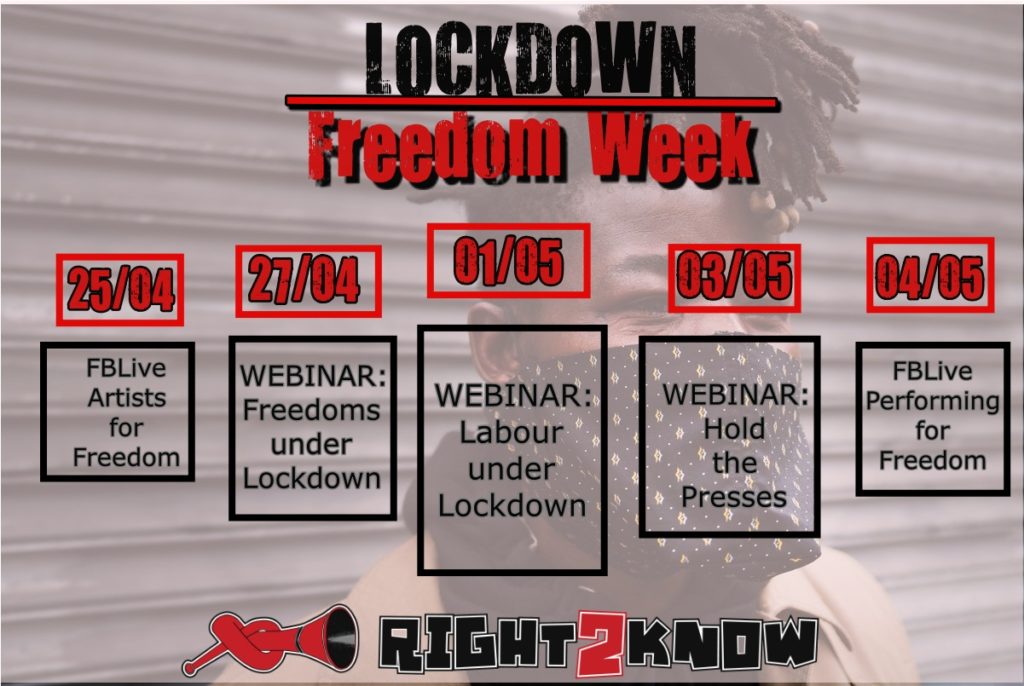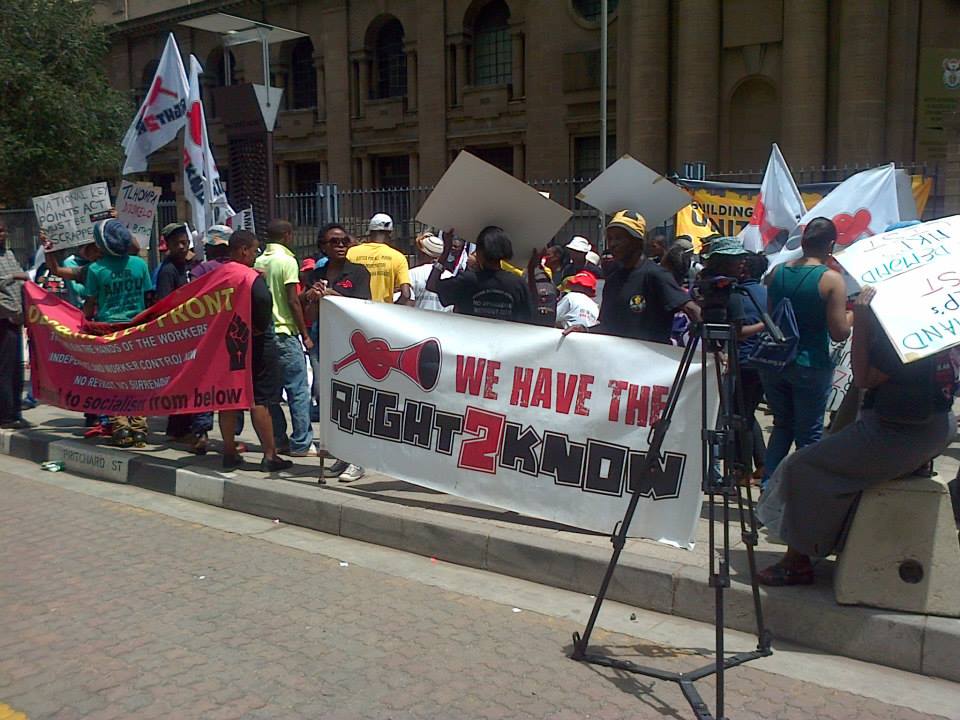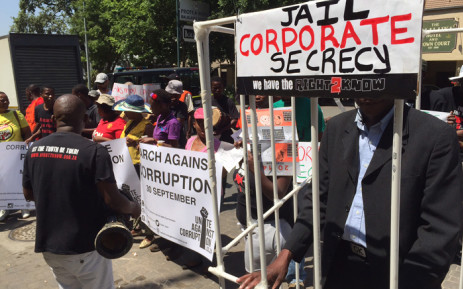R2K Statement | Freedom Week 2020: Social distancing doesn’t mean social disconnect!
 26 April 2020
26 April 2020
Tomorrow the nation will commemorate Freedom Day for the first time in our democracy under Lockdown! In the face of a global pandemic, and to flatten the curve of infections of the coronavirus, the government has imposed severe restrictions on a number of fundamental and hard-won human rights.
Right2Know calls on South Africans to stand together in our efforts to advance our struggles for social, economic, and environmental justice. Last month the South African government responded swiftly in trying to prevent the spread of the virus by declaring a National State of Disaster in terms of the Disaster Management Act that prohibited all gatherings of more than 100 people, and even limited funerals to no more than 50 people. That has impacted our activities as a civil society movement.
Like all the other sectors we have had to adapt and continue to organise despite the lockdown regulations and to mark “Freedom Week” – 27 April (Freedom Day), 1 May (May Day) and 3 May (World Press Freedom Day) R2K will be hosting webinars to discuss how COVID-19 has impacted the nation and how are we going to organise moving forward.
With the current lockdown regulations, we continue to witness disturbing scenes where the security forces respond with brutality against vulnerable South Africans. Instead of the citizens having an experience of our security officials protecting and defending us against the impact of the Coronavirus, our experience is rather that they are clamping down on our rights and fighting citizens. We have seen reports of how structures of shack dwellers are demolished in various municipalities across the country. These illegal evictions carried out by municipalities have defied the moratorium imposed on all evictions by the COVID19 regulations. What’s more disheartening is the silence of both President Cyril Ramaphosa and Minister Lindiwe Sisulu, responsible for Human Settlements, related to these violations.
It is disappointing that 26 years into our democracy, we still have people lacking a basic shelter. While we note that the government has worked hard to avert mass deaths, this virus has exposed the failure of the government to provide basic services to all .
The extraordinary powers granted to the Executive under the National State of Disaster, and especially under the Lockdown, have restricted and affected our freedom of movement, our right to free economic activity, our freedom of association and expression, our right to gather and to petition and have even sanctioned the forced removal to temporary sites of homeless people or those who cannot self-isolate or quarantine at home. The Lockdown has also had severe economic consequences for a population already suffering under the combined impact of poverty, inequality and unemployment. These have been exacerbated by a global recession and our economy dropping into junk status. The Lockdown has become a pressure cooker – now within the home – as frustration and desperation peak. It is no surprise that food trucks have been attacked over the last week – or that there has been a sharp rise in reported cases of gender-based violence. For far too many, home is not a safe space and #StayHome just means greater vulnerability.
We are also concerned about the President’s announcement that additional 73,000 soldiers will be deployed to help enforce the lockdown to assist the government in its fight against COVID-19 under current level 4 lockdown. Daily reports of enforcement excesses – excessive fines for engaging in legitimate activities, assaults, wrongful arrest, cruel and unusual punishment and most of greatest concern, the number of deaths at the hands of a range of enforcement agencies. It is quite clear that the SANDF has not understood that it’s mandate under the lockdown regulations is a civilian support to policing and a humanitarian assistance one. The presence of the entire army, armed to the teeth on our civilian streets, belies this function. We are also concerned that the SANDF Chiefs reveal a lack of understanding of the supremacy of the Constitution – and the rights of citizens. And that even the armed forces are bound by it in the execution of domestic operations under a State of Disaster.
These excesses have been at the hands of all of our law enforcement agencies: SAPS, municipal policing and law enforcement and of course the SANDF. It has been facilitated by a bellicose and belligerent tone from the securocratic executive leadership of the Police and Defence who have allowed the gross misinterpretation of the regulations by the army and the police. Through their silence in the face of the abuses and importantly, the deaths of civilians, they are complicit in undermining the rule of law and our constitution..
We remain very concerned at the nature which our securocrats continue to conduct themselves and call on them to practice restraint and rather collaborate with citizens in the fight against the spread of Coronavirus, especially with an increased deployment of military personnel.
We therefore call for a people-centred security approach based on values of dialogue, mediation to foster better cooperation. We assert that the militarization of the response to the spread of the Coronavirus must respect and protect civil liberties. Temporary suspension of certain rights does not mean that the securocrats can take the law into their own hands. We also call on Parliament and the different portfolio committees to play their crucial oversight role over our securocrats and to be vigilant in ensuring proper reporting and accountability of the conduct of the security forces. The Regulations have also impacted our freedom of expression. Any deliberate publication or statement aimed at misleading the reader or viewer about COVID-19 or the government’s efforts to combat the virus is an offence and can result in a fine and/or imprisonment for up to 6 months. R2K, on behalf of the civil society C19 People’s Coalition, has engaged the government over the regulations with a view to strengthening the fundamental right to freedom of expression while still ensuring that we are protected against the viral nature of “fake news” and misinformation in this health crisis.
The Regulations also allow for contact tracing of suspected infected people. This entails the gathering of specific personal information and of metadata of the suspects. Given the urgency of the health crisis and the need to access this information we welcome the safeguards that have been put in place, including the appointment of a retired judge to oversee the process and reporting, the notification of people whose information has been accessed and the deletion of the information once the lockdown is lifted.
During Freedom Week we will host 4 WEBINARS to discuss freedom of assembly and association, the free flow of information, and the freedom of expression. See details of the events on our Facebook page.
Remember to spread the word on social media #FreedomWeek #OngaziMakazi #SouthAfricaLockdown
For more information contact:
Ghalib Galant, R2K Deputy National Coordinator: 084 959 1912
Thami Nkosi, R2K Countering Repression Organiser: 062 624 5992
Lazola Kati, R2K Communications Rights Organiser: 072 956 7753
Busi Mtabane, R2K National Communicator: 083 329 7844




